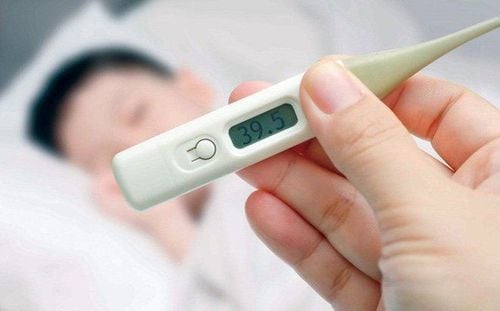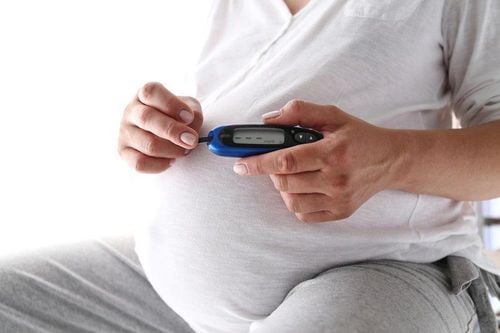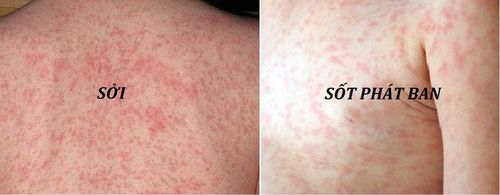This is an automatically translated article.
The article is written by Master, Doctor Nguyen Nhu Thu Truc - Obstetrician and Gynecologist - Department of Obstetrics and Gynecology - Vinmec Nha Trang International General Hospital.Viral fever in pregnant women depends on the gestational age and the type of disease that both the mother and the fetus can be affected in different degrees from mild to severe, even with the risk of causing severe malformations for the newborn. born. So what should pregnant women do with viral fever?
1. Viral fever in pregnant women
During pregnancy, a woman is likely to have a number of medical and surgical diseases and infections (caused by bacteria, viruses, and parasites) similar to when not pregnant. However, for pregnant women, the body is undergoing certain changes and the health is generally weaker, so the disease will most likely be more severe. Besides, the possibility of causing more complications for the mother and the baby is also higher than when not pregnant, especially with viral fever in pregnant women.The concept of viral fever in pregnant women refers to general cases where a pregnant mother has a fever caused by infection with different viruses (viruses). Therefore, during pregnancy, if a pregnant woman has a typhus fever lasting 7 days, a fever occurs in episodes, a high fever of 38-39oC, she should think of viral fever in pregnant women. The causes of viral fever in pregnant women can be measles, dengue infection, parvovirus infection, infectious mononucleosis, Rubella.
When pregnant women are infected with viral fever, depending on the gestational age and depending on the type of disease, the degree of impact will be different, often causing harm to both mother and child.

2. Does viral fever affect the fetus?
If a pregnant woman contracts viral fevers in the period less than 12 weeks of pregnancy (in the first 3 months - the first trimester of pregnancy), the baby in the womb can be very seriously affected, such as: miscarriages, stillbirths, fetal growth retardation, birth defects... Some of the main causes of viral fever in pregnant women can seriously affect the baby, including influenza virus, dengue fever, zika, chickenpox, rubella. Of these categories, fever caused by acute rubella infection is considered the most dangerous because it can lead to congenital rubella syndrome (with birth defects in the fetus), with a risk of up to 90%. Other viral fevers are capable of causing miscarriage but cannot leave birth defects.From the time a baby is about 12 weeks old, the overall rate of complications decreases. Usually, the larger the fetus, the safer it is because at that time the fetus and placenta have developed to a relatively large extent, helping to increase resistance to diseases transmitted from the mother. Even so, a small percentage of babies are affected. Particularly, dengue fever, if a pregnant woman gets it at the right time of childbirth, is also very dangerous, easily leading to the risk of postpartum bleeding and affecting the fetus.
However, if the fetus is more than 3 months old, but unfortunately, the pregnant woman is infected with a viral fever, she still needs to be taken to the doctor immediately for an accurate diagnosis test, and instructions on how to treat the disease safely. pregnant women as well as conduct closer monitoring of the baby's development.

3. What should pregnant women do with viral fever?
Treatment of viral fever in pregnant women is mainly to reduce fever and improve physical condition, without specific treatment.
On the other hand, many pregnant women fear that the disease will cause birth defects, so they suggest using methods to terminate the pregnancy. In fact, not every case of viral fever during pregnancy requires an abortion. Obstetricians and gynecologists only advise abortion if the fetus is less than 18 weeks old and there is clear evidence to conclude that there is a risk of fetal malformations or epidemiological studies show that the baby has more likely to have birth defects (eg, when infected with the rubella virus). Even so, whether to perform an abortion or not is still decided by the pregnant woman, but should be carefully considered with the advice of the treating doctor..
Besides, pregnant women with viral fever should continue to be careful. Disease prevention: Use a mask regularly, limit contact with sick people, avoid crowds, prevent mosquito bites, keep body warm, supplement with adequate nutrition to maintain resistance, keep body hygiene body and its surroundings. Before the next pregnancy from 3 to 6 months, pregnant women should actively vaccinate against necessary vaccines to prevent: flu, chickenpox, rubella, hepatitis B... Therefore, when pregnant If you experience unusual symptoms during pregnancy, you should be examined and consulted with a specialist.
To protect mother and baby during pregnancy, Vinmec provides a package Maternity service to help monitor the health status of mother and baby comprehensively, periodically check antenatal care with leading obstetricians, perform Full range of tests, important screening for pregnant women, timely advice and intervention when detecting abnormalities in the health of mother and baby.
For detailed information about all-inclusive maternity packages, please contact the hospitals and clinics of Vinmec health system nationwide.
Please dial HOTLINE for more information or register for an appointment HERE. Download MyVinmec app to make appointments faster and to manage your bookings easily.














